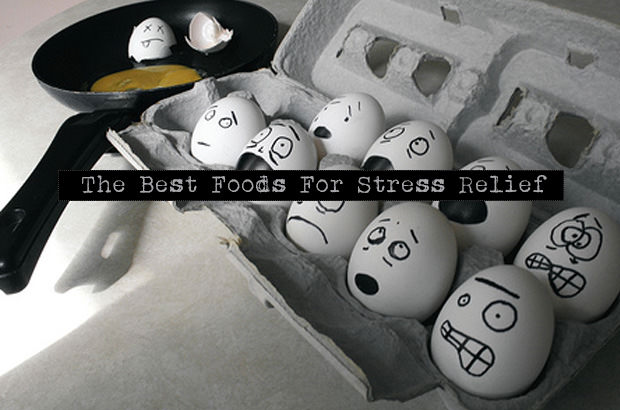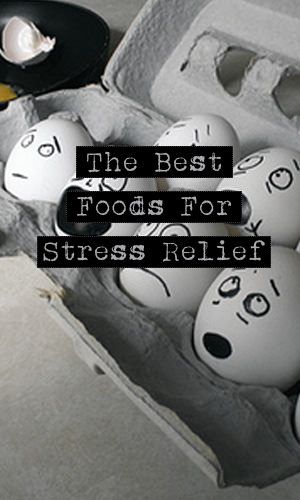
The Best Foods For Stress Relief
Posted on 26 May, 2019

There's a huge difference between comfort food and calming food. Comfort food gives you a fix, whereas calming food fixes you.
While it is tempting to drown your anxiety in a bowl of ice cream or calm your nerves with a bag of chips… eating comfort food while you’re stressed will only give you temporary reprieve. After the initial pleasure wears off, you will find yourself battling mood swings, irritability, a bursting gut and guilt.
Calming foods on the other hand relieves tension by stabilizing your blood sugar, regulating your hormones and reducing your blood pressure. Whether it’s the specific nutrients they provide, or the steady, reliable source of energy they give you, they'll get you through the day feeling focused, even, and balanced.
So the next time you feel the world closing in on you, steer clear of the vending machine. Try one of these instead.
Pistachios

A 2014 study by the American Heart Association found that eating two servings of pistachios a day lowered vascular constriction. Because the arteries become more dilated, the result is lower blood pressure and less load on the heart.
The rhythmic act of shelling pistachios is also therapeutic to some, and can help quiet racing thoughts. Also, because the added step of cracking open a shell slows down your eating, it is easier to pace yourself.
Chamomile Tea

There is something wonderfully calm about holding a mug of chamomile in a quiet corner right before bedtime. But there is more to it. A study from the University of Pennsylvania found that consumption of chamomile led to a significant drop in anxiety symptoms. And according to the University of Maryland Medical Center, there is some evidence that, in addition to calming frazzled nerves, chamomile promotes sleep.
Green Leafy Vegetables

Research has shown a link between depression and low levels of folate. Derived from the Latin word folium, which means "leaf", folates occur naturally in many foods and are especially plentiful in dark green leafy vegetables.
A 2012 study in the Journal of Affective Disorders revealed that people who consumed the most folate had a lower risk of depression. And, a 2013 study from the University of Otago found that college students felt calmer, happier, and more energetic on days they ate more fruits and vegetables. It was discovered that folates promote the production of mood-regulating hormones like dopamine and serotonin, which help you keep calm.
Fatty Fish

When you're stressed, anxiety hormones such as adrenaline and cortisol are produced. The heart-healthy omega-3 fats in fish such as salmon, sardines and tuna have anti-inflammatory properties that can help counteract the negative effects of these stress hormones. This was revealed in a study by the National Institute of Health, which found that people who took omega-3 supplements had a 20% reduction in anxiety compared to the group given placebo pills.
Turkey

Turkey is a good source of tryptophan, an amino acid that your body converts into serotonin. A 2006 study published in the Journal of Psychiatry Neuroscience reported that people who consumed tryptophan become markedly more pleasant than those who didn’t consume it.
Berries

The antioxidants and phytonutrients found in berries improve your body's response to stress by fighting stress-related free radicals. Research published in TIME revealed that blueberry eaters experienced a boost in natural killer cells, a type of white blood cell that plays a vital role in immunity and is critical for countering stress.
[Read: Antioxidants - A Clear And Simple Explanation]
Dark Chocolate

Because it is high in antioxidants like polyphenols and flavonols, dark chocolate relaxes the walls of your blood vessels, lowering blood pressure and improving circulation. Dark chocolate also promotes the production of anandamide, a neurotransmitter produced in the brain that temporarily blocks feelings of pain and depression.
Seeds

Flaxseed, sesame seeds, pumpkin seeds, and sunflower seeds are all great sources of magnesium. Magnesium, which acts as a precursor for neurotransmitters like serotonin, is well-known for its role in alleviating depression, fatigue, and irritability. Magnesium also helps fight PMS symptoms, including cramps and water retention.
Avocado

Many pieces of research have linked the feelings of anxiety with a vitamin B deficiency. The B group of vitamins play an important role in blood sugar control, many enzymatic processes, and the regulation of adrenals, all of which affects our mood.
Avocados are not only rich in stress-relieving B vitamins but provide close to 20 essential health-boosting nutrients. It also has more folate than any other fruit and is loaded with potassium, a vital mineral for keeping blood pressure low.
A 2014 study by Loma Linda University found that adding half an avocado to your lunch reduced your desire to eat for the three hours following your meal. That full feeling will make you less inclined to reach for unhealthy snacks when stress kicks in. The study also found that avocados helped regulate blood sugar levels. This combination of satiety and blood-sugar regulation helps steady your mood.
Oysters

Low levels of zinc have been linked to both anxiety and depression, and oysters are a great source of zinc. Since our bodies have no way of storing zinc, it's important to consume it steadily in our diet. Cashew nuts are another good source of zinc.
Yogurt

Unhealthy gut flora can have a detrimental impact on your brain health, leading to issues like anxiety and depression. A 2013 UCLA study among 36 healthy women revealed that consuming probiotics in yogurt reduced brain activity in areas that handle emotion, including stress. The probiotic Lactobacillus rhamnosus was found to have a marked effect on GABA levels in certain brain regions and lowered the stress-induced hormone corticosterone, resulting in reduced anxiety- and depression-related behavior.
Photo Credits
Great Books For Healthy Eating

by Angela Liddon

by Michael Pollan

by Dr. Alejandro Junger

by Jo Robinson

 How To Get Out Of Work Earlier
How To Get Out Of Work Earlier Most Surprising Unhealthy Foods
Most Surprising Unhealthy Foods Free Radicals - A Clear And Simple Explanation
Free Radicals - A Clear And Simple Explanation Natural Home Remedies For Eczema
Natural Home Remedies For Eczema










